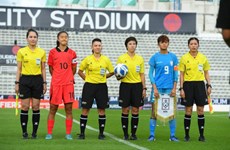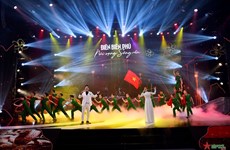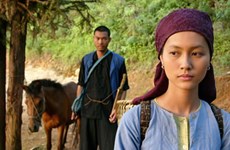Local thespians attend Shakespeare fest
The Vietnam Youth Theatre has been invited for the first time to attend
the annual World Shakespeare Festival in Liverpool in June – a mark of
Vietnamese theatre's growing profile internationally.
The Vietnam Youth Theatre has been invited for the first time to attend
the annual World Shakespeare Festival in Liverpool in June – a mark of
Vietnamese theatre's growing profile internationally.
Actors will stage the macabre Shakespearean play Macbeth in Vietnamese.
The theatre performed at festivals in Beijing in 2003 and Shanghai in 2005.
The Youth Theatre production was based on the play staged by veteran director Le Hung in 2002, which has been performed 68 times, said Truong Nhuan, the theatre's deputy director, adding that it was enthusiastically received in China particularly because of the Asian theatrical motifs used in the scene depicting the death of Macbeth's wife.
Youth Theatre actors have been given lectures in Western literature by theatre critic Nguyen Thi Minh Thai ahead of their going to London .
"The play is very Vietnamese in character because director Hung used dances from Vietnamese tuong (classical opera)," Nhuan said.
Lady Macbeth died in a "blood" fillet, without a word being uttered. Yet the scene would be well-understood by theatre-goers because the play was widely known, Nhuan added.
Anh Tu, who plays Macbeth, said: "I'm very enthusiastic about playing Macbeth. I have performed in many classical plays from around the world and am not short on experience. I am delighted to have been given the chance to play this part."
In the early 1990s, a work by Vietnamese playwright Luu Quang Vu entitled Hon Truong Ba Da Hang Thit (Truong Ba's Soul in Butcher's Body) debuted at the Moscow International Theatre Festival.
The play was later staged in the US .
Nguyen Van Tinh, head of the Ministry of Culture, Sports and Tourism's Foreign Co-operation Department, said language was no barrier when it came to theatre. "The success of the tour of 20 colleges in the US of Truong Ba's Soul in Butcher's Body, with English subtitles, proves that language is no barrier," he said.
"If we want Vietnamese drama to be known to the world, we should choose scenarios which meet audiences' tastes, even if we have to make changes to the script."
The first Western-style drama to be performed in Vietnam was Nguoi Benh Tuong (Valetudinarian) by French playwright Moliere.
In 1921, Vietnam staged its first modern drama Chen Thuoc Doc (A Cup of Poison) by Vu Dinh Long, which was a dramatic departure from traditional Vietnamese theatre.
Theatre critic Thai said Western productions could easily be adapted for the Vietnamese stage.
"Many theatre productions by Henrik Ibsen and Shakespeare have been performed in Vietnam . I think Vietnamese actors should tell Western stories their own way," she said.
The Youth and Vietnam Drama theatres, in co-operation with foreign directors, have staged two productions in Vietnam .
One was funded by the US Department of State's Cultural Envoys Programme and was directed by the US 's Neil S Fleckman.
The other was funded by the French culture institute L'Espace and the Viet Nam Drama Theatre.
To celebrate the 40th anniversary of diplomatic ties between Vietnam and France , the drama Andromake, written by Jon Fosse, an adaptation of Racine 's L'Andromaque, was staged last December by director Jean-Marie Lejude from the L'oeil du Tigre troupe.
In this version, four French and four Vietnamese actors spoke to each other in their native languages. There were Vietnamese subtitles.
"We decided to combine actors from the two countries. Although they spoke in their respective languages, the common theme was the language of artistry," said Lejude. "It was amazing to put on a drama with both Vietnamese and French actors."
Ngan Hoa, who was one of the four Vietnamese actors in the play, said the experience was thrilling.
"We had to feel how the foreign partners felt. The most important thing was to feel the pulse of our partners. Language was not problem," Hoa said.
Meanwhile, Fleckman was full of praise for Vietnamese acting.
"The Vietnamese actors were very bright. The only occasional issues involved semantics. The vast majority of the time, the actors and I understood each other perfectly./.
Actors will stage the macabre Shakespearean play Macbeth in Vietnamese.
The theatre performed at festivals in Beijing in 2003 and Shanghai in 2005.
The Youth Theatre production was based on the play staged by veteran director Le Hung in 2002, which has been performed 68 times, said Truong Nhuan, the theatre's deputy director, adding that it was enthusiastically received in China particularly because of the Asian theatrical motifs used in the scene depicting the death of Macbeth's wife.
Youth Theatre actors have been given lectures in Western literature by theatre critic Nguyen Thi Minh Thai ahead of their going to London .
"The play is very Vietnamese in character because director Hung used dances from Vietnamese tuong (classical opera)," Nhuan said.
Lady Macbeth died in a "blood" fillet, without a word being uttered. Yet the scene would be well-understood by theatre-goers because the play was widely known, Nhuan added.
Anh Tu, who plays Macbeth, said: "I'm very enthusiastic about playing Macbeth. I have performed in many classical plays from around the world and am not short on experience. I am delighted to have been given the chance to play this part."
In the early 1990s, a work by Vietnamese playwright Luu Quang Vu entitled Hon Truong Ba Da Hang Thit (Truong Ba's Soul in Butcher's Body) debuted at the Moscow International Theatre Festival.
The play was later staged in the US .
Nguyen Van Tinh, head of the Ministry of Culture, Sports and Tourism's Foreign Co-operation Department, said language was no barrier when it came to theatre. "The success of the tour of 20 colleges in the US of Truong Ba's Soul in Butcher's Body, with English subtitles, proves that language is no barrier," he said.
"If we want Vietnamese drama to be known to the world, we should choose scenarios which meet audiences' tastes, even if we have to make changes to the script."
The first Western-style drama to be performed in Vietnam was Nguoi Benh Tuong (Valetudinarian) by French playwright Moliere.
In 1921, Vietnam staged its first modern drama Chen Thuoc Doc (A Cup of Poison) by Vu Dinh Long, which was a dramatic departure from traditional Vietnamese theatre.
Theatre critic Thai said Western productions could easily be adapted for the Vietnamese stage.
"Many theatre productions by Henrik Ibsen and Shakespeare have been performed in Vietnam . I think Vietnamese actors should tell Western stories their own way," she said.
The Youth and Vietnam Drama theatres, in co-operation with foreign directors, have staged two productions in Vietnam .
One was funded by the US Department of State's Cultural Envoys Programme and was directed by the US 's Neil S Fleckman.
The other was funded by the French culture institute L'Espace and the Viet Nam Drama Theatre.
To celebrate the 40th anniversary of diplomatic ties between Vietnam and France , the drama Andromake, written by Jon Fosse, an adaptation of Racine 's L'Andromaque, was staged last December by director Jean-Marie Lejude from the L'oeil du Tigre troupe.
In this version, four French and four Vietnamese actors spoke to each other in their native languages. There were Vietnamese subtitles.
"We decided to combine actors from the two countries. Although they spoke in their respective languages, the common theme was the language of artistry," said Lejude. "It was amazing to put on a drama with both Vietnamese and French actors."
Ngan Hoa, who was one of the four Vietnamese actors in the play, said the experience was thrilling.
"We had to feel how the foreign partners felt. The most important thing was to feel the pulse of our partners. Language was not problem," Hoa said.
Meanwhile, Fleckman was full of praise for Vietnamese acting.
"The Vietnamese actors were very bright. The only occasional issues involved semantics. The vast majority of the time, the actors and I understood each other perfectly./.













